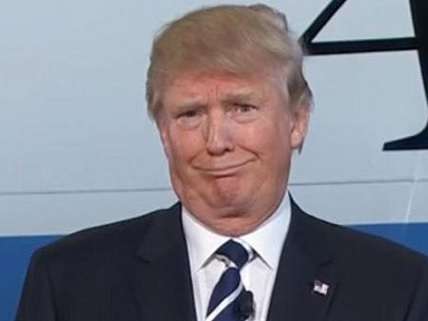Three Ways Trump is a Democrat Problem Too
So much blame for Donald Trump's populism. What about Bernie Sanders'?

Some Democrats are starting to express public concern about the strength of Republican frontrunner Donald Trump's potential appeal in a general election contest, as Democratic party leaders continue to insist a Trump nomination would be their best outcome.
"Be careful what you ask for," Rep. Bonnie Thompson (D-Miss.) told The Hill. "A few months ago, nobody gave Donald Trump a chance of being a serious contender. Now he's the leader."
Rep. John Larson (D-Conn.), a former head of the Democratic caucus, said he'd warned to take Trump seriously for months. "I do think he has appeal, to independents and blue-collar Democrats especially," Larson said.
"He comes along and says, 'I'm a deal maker, I'm about getting the deal done'," Larson told The Hill. "And they're so fed up of seeing nothing getting done and want to see him on the issues that strike to the core of their feelings."
Trump's particular lack of substantive policy proposals, even for often mealy-mouthed presidential campaigns, as well as his reliance on nationalist rhetoric, make it easier to interpret Trump solely through the lens of the appeal of celebrity bravado/machismo and populist/nationalist/racist feeling. Yet some of the political assumptions underlying Trump's coalition are hardly unique to him, or to Republicans.
The basis of the idea that Trump has cross-over appeal is rooted in some of the similarities between him and Bernie Sanders, the only Democratic candidate other than long-time presumptive nominee Hillary Clinton to make it past Iowa, and such an appeal could complicate things for Democrats, especially as illustrated by Sanders' campaign. Here's how:
TRUMP AND SANDERS OVERLAP ON IMMIGRATION
Sanders has said "open borders" (the principle that free people should be able to cross a border freely) are a right-wing conspiracy, hocking the myth that immigration deteriorates labor conditions in America. "They took er jerbs." Trump and other Republican's anti-immigration rhetoric is based on fears of immigrants that led 61 percent of Americans survey in a recent poll to say immigration of all kinds "jeopardizes the United States."
BOTH SIDES STOKE FEAR OF MUSLIMS
While Trump floated the idea of denying entry to Muslims (eventually correcting himself to say non-citizen Muslims) to "figure out" what was happening with terrorism, Sanders has framed U.S. involvement in the fight against ISIS as some sort of "war for the soul of Islam."
President Obama may publicly bemoan Islamophobia, but despite the change in war on terror terminology, he has expanded military operations in the Muslim world under the guise of counterterrorism. That's contributed to softening the ground for Islamophobia whether or not Obama himself acknowledges the U.S. government is killing military-aged Muslim males because they fit a terrorist profile.
TRUMP AND SANDERS SCAPEGOAT MONEY IN POLITICS
Another Trump selling point is his imperviousness to the influence of money in politics, another tool to create fear of an out-group. Sanders calls for a revolution against the "billionaires." The utter failure of "big money" super PACs to catapult candidates like Jeb Bush past Trump has done little to temper the misguided idea peddled by Democrats (and Donald Trump) that the desire to spend money to express yourself politically represents some kind of "threat" to democratic elections and so that certain people, identified by how much money they spend on political expression, should be scrutinized.
Last week, it was Trump's rhetoric on money in politics that yielded kind words from Louis Farrakhan in a sermon the Nation of Islam minister delivered recently. Trump, the anti-semitic Farrakhan noted, was the only candidate "who has stood in front of the Jewish community and said I don't want your money." For a long time in American politics and culture, Wall Street, moneyed interestes, and Jewishness were used as synonyms.
"Any time a man can say to those who control the politics of America, I don't want your money, that means you can't control me," Farrakhan said. "And they can't afford to give up control of the presidents of the United States."
Democrats, and Trump, may stick to the more generic "Wall Street" in their out-group fearmongering, but it shouldn't be a surprise anti-Semitic sentiment could be easily grafted onto that, especially as references to "Wall Street" are increasingly disconnected from specific concerns. "The business model of Wall Street is fraud," Sanders, the first Jewish candidate to win a major party primary, said at a recent debate. He may not be dogwhistling when he uses such rhetoric, but that doesn't mean there's not a dogwhistle there to blow on. It's what attracted Farrakhan about Trump, despite Trump's repeated assertions he'd be the "best" for Israel and Farrakhan's strongly anti-Israel views.
That trend toward the creation of out-groups—immigrants, Muslims, the rich, and other internal and external groupings based on race, class, gender, or whatever else—is the frothy mix out of which Donald Trump has emerged. Outrage directed toward him may have the perverse effect of playing into the us vs. them narrative Trump is using to build political support while avoiding the uncomfortable exercise of acknowledging similar, albeit differently packaged and presented, narratives by Sanders. The two aren't the first populist candidates America has seen, and are unlikely to be the last.


Show Comments (142)